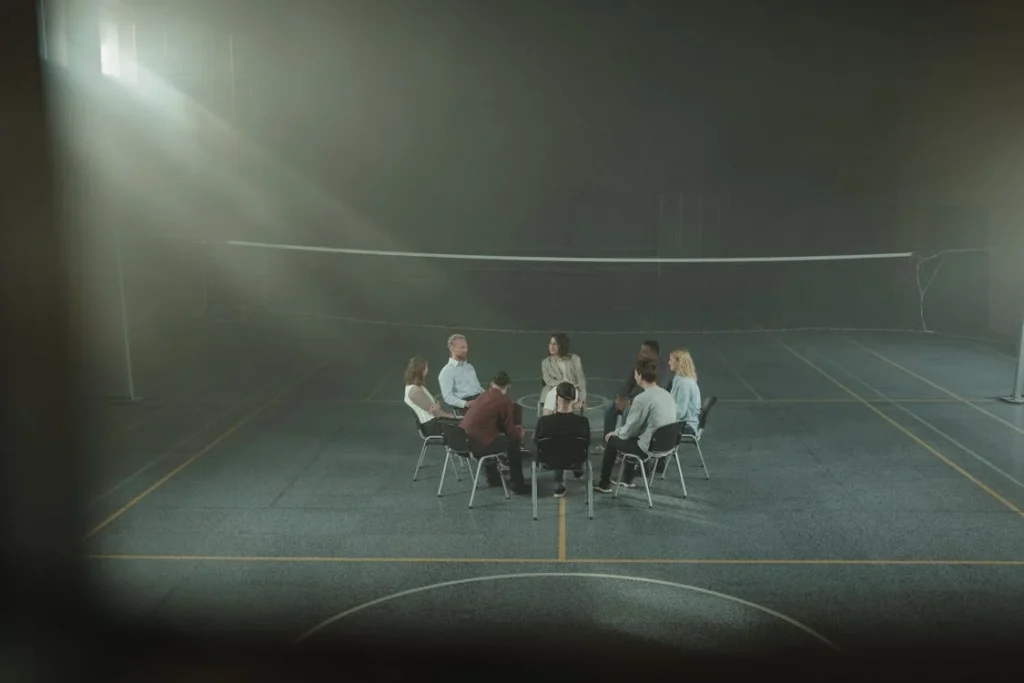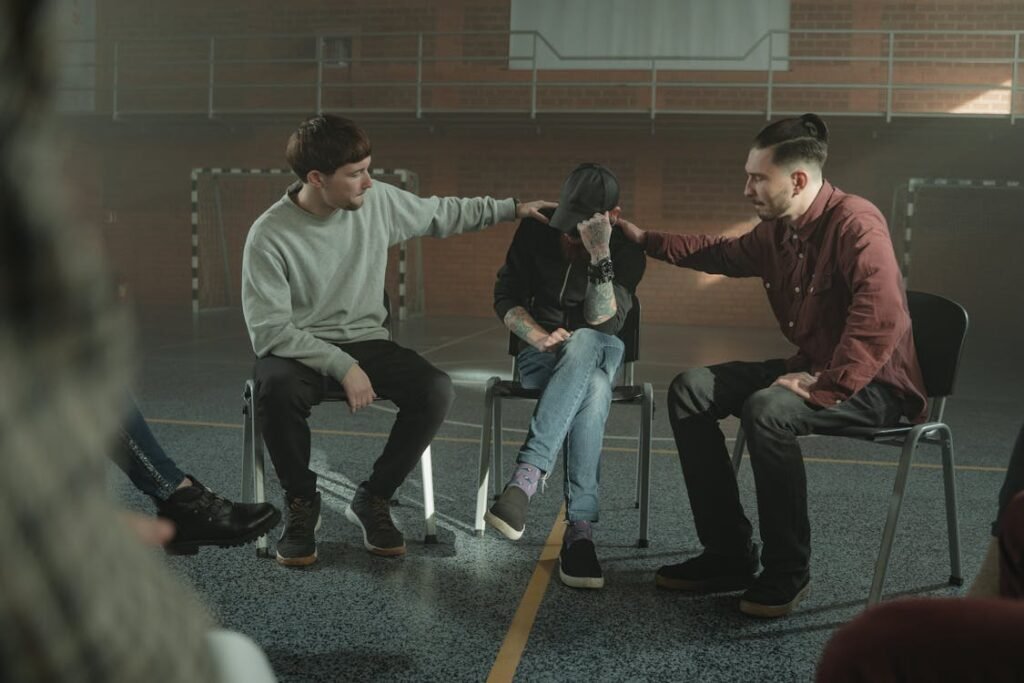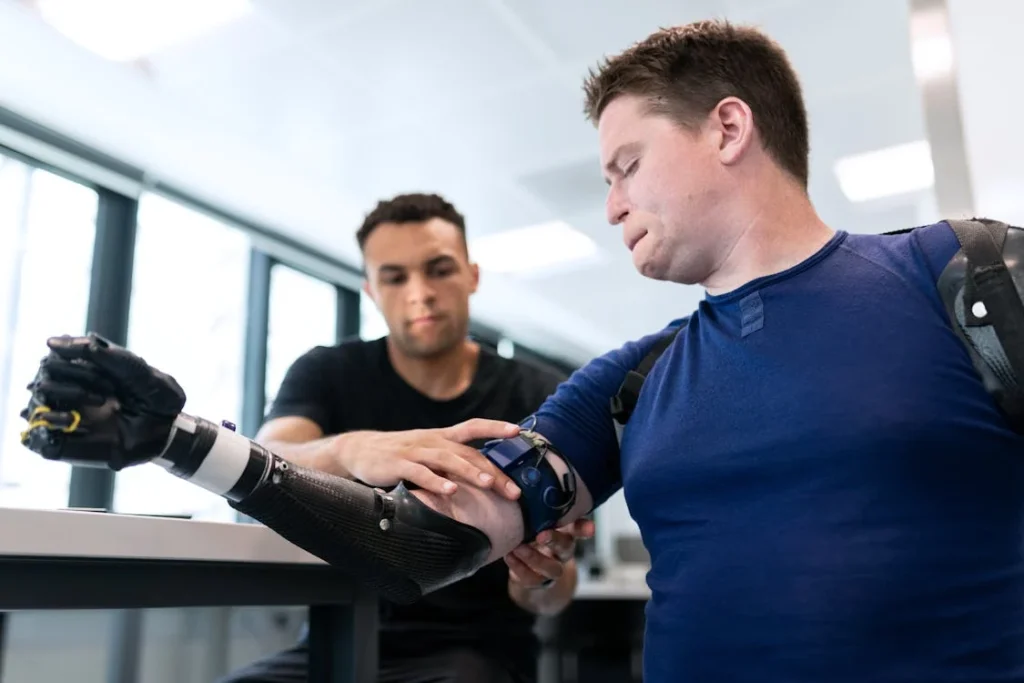Losing a limb is not just a physical challenge—it is an emotional and psychological one as well. Many amputees struggle with grief, fear, frustration, and uncertainty about the future. The body must heal, but so must the mind. The emotional impact of amputation can be overwhelming, making it difficult to adjust to a new way of life.
This is where therapy plays a crucial role. Whether through counseling, physical rehabilitation, or innovative therapeutic techniques, the right support can help amputees process their emotions, rebuild confidence, and regain independence. Therapy is not just about coping—it is about finding strength, adapting to change, and rediscovering the ability to lead a fulfilling life.

Understanding Trauma After Amputation
Losing a limb is a life-altering event, both physically and emotionally. The body undergoes a significant change, but the mind also struggles to process the loss.
For many amputees, the experience is traumatic, bringing a mix of emotions such as grief, anger, fear, and uncertainty. This emotional impact is just as important to address as the physical recovery.
Why Amputation Causes Emotional Trauma
Trauma occurs when the brain perceives an event as deeply distressing or life-threatening. Amputation can be the result of an accident, illness, or medical condition, often occurring suddenly and without much preparation.
Even when a person knows that amputation is necessary for survival, the reality of losing a limb can be overwhelming.
One of the biggest challenges is loss of control. Many amputees feel as if their bodies have betrayed them or that they had no choice in what happened.
This can lead to feelings of helplessness, frustration, and even guilt. Some individuals replay the events leading up to the amputation, wondering if something could have been done differently.
In addition to emotional distress, some amputees experience post-traumatic stress disorder (PTSD), especially if the limb loss resulted from an accident, combat injury, or medical emergency.
Flashbacks, nightmares, anxiety, and panic attacks are common signs of trauma that can make healing even more difficult.
The Stages of Emotional Healing
Just like grief, healing from trauma after amputation happens in stages. At first, many amputees experience denial, struggling to accept their new reality.
This is often followed by anger, directed at themselves, doctors, or the situation that caused the amputation. Sadness and depression can set in, making it difficult to find motivation or hope for the future.
Over time, with the right support and therapy, acceptance begins to take shape. Acceptance does not mean being happy about the loss, but rather learning to live with it and move forward.
This process is different for everyone, but therapy plays a key role in guiding amputees through these emotions in a healthy and constructive way.
Understanding that trauma is a normal response to amputation helps remove the stigma around seeking help. Emotional recovery is just as important as physical rehabilitation, and therapy offers the tools needed to cope, adapt, and rebuild confidence.

How Therapy Helps Amputees Heal Emotionally
Recovering from an amputation is not just about physical rehabilitation—it is also about rebuilding emotional strength. Therapy provides amputees with a safe space to process their emotions, develop coping mechanisms, and regain confidence in their abilities.
It helps address trauma, anxiety, and depression while offering practical strategies for adapting to a new way of life.
Psychological Therapy: Healing the Mind
One of the most effective ways to process the emotional impact of amputation is through psychological therapy. Talking to a trained professional can help amputees understand and navigate their feelings, rather than feeling overwhelmed by them.
Therapy sessions provide guidance on dealing with loss, managing stress, and reframing negative thoughts.
Cognitive Behavioral Therapy (CBT) is one of the most commonly used approaches. It helps individuals identify negative thought patterns and replace them with healthier, more constructive perspectives.
For example, instead of thinking, “I’ll never be able to do the things I love again,” CBT helps reframe this as, “I may need to do things differently, but I can still lead a fulfilling life.” This shift in mindset plays a significant role in emotional recovery.
For those experiencing post-traumatic stress disorder (PTSD) due to a traumatic amputation, therapy can help reduce flashbacks, anxiety, and panic attacks.
Techniques such as exposure therapy and eye movement desensitization and reprocessing (EMDR) have been effective in helping amputees work through trauma and regain control over their emotional responses.
Group therapy is another powerful tool. Connecting with others who have experienced limb loss can reduce feelings of isolation and provide encouragement from people who truly understand.
Peer support groups, whether in person or online, create a sense of community where amputees can share their experiences, learn from each other, and celebrate progress together.
Physical Therapy: Regaining Control Over the Body
While psychological therapy focuses on emotional healing, physical therapy is essential for restoring independence and mobility. After an amputation, the body must adjust to a new way of moving, whether with or without a prosthetic limb.
This adjustment can be physically challenging, but it also plays a major role in boosting confidence and reducing frustration.
Working with a physical therapist helps amputees strengthen their muscles, improve balance, and develop techniques for performing daily activities.
The progress made in physical therapy is often closely tied to emotional well-being. As individuals regain their ability to walk, move, or use a prosthetic effectively, their confidence grows. They begin to see themselves as capable rather than limited.
For many, the fear of falling or failing in physical therapy can be overwhelming. However, with guided support and encouragement, amputees learn that they can overcome these fears and reclaim their independence.
The sense of accomplishment that comes with regaining mobility is one of the most powerful motivators in the healing process.
Occupational Therapy: Adapting to Everyday Life
Beyond physical therapy, occupational therapy helps amputees relearn essential skills for daily living.
Losing a limb can make tasks such as dressing, cooking, or driving more difficult, but occupational therapy teaches new techniques and strategies to perform these activities independently.
Occupational therapists introduce assistive tools, adaptive techniques, and customized exercises to help amputees regain function.
These small victories—like learning how to button a shirt with one hand or use kitchen utensils with a prosthetic—help restore a sense of normalcy and control.
The goal of therapy is not just to help amputees cope but to help them thrive. By addressing both the emotional and physical challenges of amputation, therapy empowers individuals to move forward with strength, confidence, and a renewed sense of purpose.

The Role of Prosthetic Training in Emotional Recovery
For many amputees, adjusting to life with a prosthetic limb is a key part of the healing journey. While prosthetics restore mobility and function, learning to use them effectively takes time, patience, and proper training.
Prosthetic therapy not only helps with physical adaptation but also plays a significant role in boosting confidence, independence, and emotional well-being.
Overcoming Initial Frustrations with Prosthetic Use
The first experience with a prosthetic can be overwhelming. Many amputees expect it to feel like a natural extension of their body immediately, but in reality, using a prosthetic requires practice and adjustment.
Early challenges, such as discomfort, difficulty with movement, or trouble with fit, can lead to frustration. Without proper support, some individuals may feel discouraged and question whether using a prosthetic is worth it.
This is where prosthetic training becomes essential. Working with a prosthetist and a physical therapist ensures that the limb is fitted correctly and that the user learns how to move naturally.
Simple exercises, such as weight shifting, balance training, and gait practice, help amputees develop muscle memory and coordination. Over time, these skills become second nature, allowing for smoother, more natural movements.
At Robobionics, we understand that a well-designed prosthetic is only part of the solution. Personalized prosthetic training helps amputees regain confidence in their mobility and reduces the emotional stress that can come with adaptation.
If you are considering a prosthetic or struggling with fit and function, we encourage you to schedule a free demo to explore how the right prosthetic can improve your quality of life.
Restoring a Sense of Identity and Control
For many amputees, a prosthetic limb represents more than just function—it is a symbol of independence and recovery. The ability to walk, grab objects, or perform tasks without assistance can restore a sense of normalcy and self-reliance.
However, the emotional adjustment to wearing a prosthetic is just as important as the physical one.
Some individuals worry about how others will perceive them. They may feel self-conscious about the way their prosthetic looks or whether people will stare.
Overcoming these feelings takes time, but as an amputee becomes more comfortable and skilled in using their prosthetic, their confidence grows.
Having access to customized prosthetic options also helps with emotional acceptance. Modern prosthetics, like Grippy™ by Robobionics, are designed to be lightweight, ergonomic, and user-friendly, making the adjustment process easier.
Some users choose cosmetic prosthetics that resemble a natural limb, while others embrace a more high-tech appearance. The important thing is that each person finds a prosthetic solution that makes them feel comfortable and confident.
The Connection Between Prosthetic Use and Mental Health
Studies have shown that amputees who successfully integrate a prosthetic into their daily lives experience improved mental health outcomes.
The ability to move independently reduces stress, increases social engagement, and lowers the risk of depression.
Physical activity, which becomes easier with prosthetic use, also helps release endorphins—natural chemicals in the brain that improve mood and reduce pain perception.
For those struggling with phantom limb pain, using a prosthetic can sometimes help retrain the brain to recognize the new limb as part of the body. This process, known as sensory reintegration, can reduce discomfort and make movement feel more natural.
Prosthetic therapy is not just about learning how to walk or grasp objects—it is about rebuilding confidence, restoring independence, and helping amputees reclaim their lives.
With the right training, support, and mindset, adjusting to a prosthetic can be a transformative experience that empowers amputees to move forward with strength and resilience.

The Importance of Emotional Support in the Healing Process
Recovering from an amputation is not just about regaining physical abilities—it is also about rebuilding emotional strength. No one should have to face this journey alone, and having a strong support system can make a huge difference in emotional healing.
Whether through family, friends, therapists, or peer support groups, connecting with others helps amputees process their emotions, share their experiences, and find encouragement in difficult moments.
The Role of Family and Friends
Family members and close friends often play a crucial role in an amputee’s recovery. Their support can come in many forms, from helping with daily tasks to simply being there to listen. However, it is also important for loved ones to understand that emotional healing takes time.
Many amputees struggle with feelings of frustration, sadness, or loss, and while well-meaning friends may try to offer quick encouragement, sometimes what is needed most is patience and understanding.
Instead of saying, “You’ll be fine soon,” it can be more helpful to acknowledge the challenge with words like, “I know this is tough, and I’m here for you.”
Educating family members about phantom limb pain, prosthetic adaptation, and emotional recovery can also make the process easier. When loved ones understand what the amputee is going through, they can provide more meaningful and empathetic support.
Peer Support: Learning from Others Who Understand
One of the most powerful sources of emotional healing comes from connecting with other amputees. Speaking to people who have been through similar experiences can provide hope, encouragement, and valuable advice.
Support groups—whether in-person or online—offer a space where amputees can talk openly about their challenges, celebrate progress, and gain inspiration from those who have successfully adapted to life after limb loss.
Seeing someone else who has regained independence and confidence can help reduce fear and uncertainty, making the path to recovery feel less daunting.
At Robobionics, we believe in the strength of community. That is why we encourage individuals to seek peer support networks and connect with others who understand the realities of amputation.
No one should have to go through this journey alone, and having the right people by your side can make a world of difference.
Professional Counseling and the Power of Guided Emotional Support
For some amputees, the emotional impact of limb loss is overwhelming. Feelings of grief, anger, or depression can become difficult to manage alone. In these cases, working with a professional counselor or psychologist can provide life-changing benefits.
Therapists trained in trauma recovery, grief counseling, and disability adjustment can help amputees process their emotions in a healthy way. They offer strategies for managing anxiety, coping with social changes, and developing a positive mindset.
Many amputees feel guilt or sadness over losing their former sense of self, but therapy helps them shift their focus toward growth and adaptation. With guided support, amputees can set goals, build resilience, and regain confidence in their abilities.
Therapy is not a sign of weakness—it is a powerful step toward emotional empowerment. Healing does not happen overnight, but with the right support, amputees can move forward with strength, acceptance, and hope.

Overcoming Social Anxiety and Rebuilding Confidence
Adjusting to life after an amputation is not just about physical and emotional healing—it also involves learning how to navigate social situations with confidence.
Many amputees struggle with self-consciousness, fearing how others will perceive them. Some worry about unwanted attention, while others feel hesitant to engage in conversations about their limb loss.
These feelings are completely normal, but with time and the right mindset, it is possible to overcome social anxiety and regain self-assurance.
Facing the Fear of Judgment
After an amputation, it is common to feel like all eyes are on you when stepping into public spaces. Whether wearing a prosthetic or adjusting to life without one, some people worry about being treated differently.
The truth is, while some people may notice, most are simply curious or unaware of the challenges amputees face.
One way to manage these worries is by preparing for interactions ahead of time. If someone asks about your amputation, you can choose how much or how little to share.
A simple response like, “I had surgery, but I’m doing well now,” can be enough to shift the focus away from your limb and onto the conversation at hand.
If you feel comfortable sharing more, it can even be an opportunity to educate others and spread awareness about limb loss.
Over time, as you become more confident in social situations, the fear of judgment fades. Instead of worrying about how others see you, the focus shifts to embracing your own sense of identity and strength.
Learning to Accept and Embrace Your New Normal
Self-acceptance is a crucial part of rebuilding confidence. Many amputees struggle with body image concerns, especially if they feel like they look different than before. However, the key to confidence is not in how you appear—it is in how you feel about yourself.
Wearing clothes that make you feel comfortable, engaging in activities you enjoy, and surrounding yourself with supportive people can help rebuild self-esteem.
Some amputees choose to customize their prosthetics with unique designs, while others embrace their limb difference as part of their personal story.
There is no right or wrong way to approach self-image—what matters most is finding what makes you feel authentic and empowered.
At Robobionics, we believe that prosthetics should enhance not just mobility but also self-confidence.
Our Grippy™ prosthetic hand is designed to be both functional and comfortable, helping users feel at ease in their daily lives.
If you are looking for a prosthetic that blends technology, comfort, and confidence, we encourage you to schedule a free demo and experience the difference for yourself.
Returning to Work and Social Activities
Getting back to work, hobbies, or social gatherings can feel overwhelming at first. Some amputees fear that they will not be able to perform tasks as they once did, while others worry about how colleagues or friends will react to their limb loss.
These concerns are valid, but with patience and adaptation, returning to normal life is entirely possible.
For those re-entering the workforce, speaking with employers about workplace accommodations can help create a supportive environment.
Many companies offer ergonomic tools, flexible work arrangements, or adaptive technologies that make daily tasks easier. It is important to focus on abilities rather than limitations—with the right adjustments, most amputees can continue in their careers successfully.
Engaging in social activities also plays a big role in emotional recovery. Whether it is attending community events, joining a hobby group, or simply spending time with family and friends, staying connected helps prevent isolation and improves overall well-being.
The more you engage with the world, the more confident you become in navigating life post-amputation.
Confidence is not built overnight, but with small steps, self-compassion, and a strong support system, it grows stronger each day. The road to recovery is not just about adapting to a new reality—it is about thriving in it.

The Role of Adaptive Sports and Recreational Therapy in Emotional Healing
One of the most empowering ways for amputees to rebuild confidence and overcome trauma is through adaptive sports and recreational therapy.
Physical activity is not just about fitness—it plays a crucial role in emotional healing by boosting self-esteem, reducing stress, and promoting a sense of accomplishment.
For many amputees, engaging in sports or recreational activities helps shift the focus from what was lost to what is still possible.
How Physical Activity Supports Mental Well-Being
Exercise has long been linked to improved mental health. When we move our bodies, we release endorphins, the brain’s natural mood boosters.
These chemicals help reduce stress, anxiety, and depression—all of which are common after amputation. Staying active also improves sleep, enhances concentration, and provides a sense of structure in daily life.
For amputees, engaging in adaptive sports or recreational therapy helps build both physical and emotional strength. Whether it is swimming, cycling, running, or playing a team sport, the benefits go beyond just movement.
These activities foster resilience, provide a social outlet, and prove that life after amputation can still be active and fulfilling.
Exploring Adaptive Sports and Activities
Thanks to advancements in prosthetics and assistive technology, amputees today have access to a wide range of adaptive sports. Whether someone is a beginner or a lifelong athlete, there are opportunities to stay active in a way that fits individual needs and abilities.
Some of the most popular adaptive sports include:
- Running and Cycling: With the right prosthetic limbs, amputees can return to running, jogging, or cycling. Specially designed running blades or custom-fit biking prosthetics make mobility easier and more efficient.
- Swimming: Many amputees find swimming to be a great way to stay active without putting pressure on the residual limb. Water resistance also helps build strength and flexibility.
- Wheelchair Basketball and Tennis: Those with lower-limb amputations can engage in wheelchair-based sports, which provide excellent cardiovascular exercise and team-building experiences.
- Rock Climbing and Hiking: Adaptive climbing harnesses and prosthetic modifications make outdoor adventures possible, giving amputees the chance to explore nature and push their physical limits.
Participating in these activities helps amputees regain confidence in their bodies. It proves that limb loss does not mean the end of an active lifestyle—it simply means finding new ways to move and engage with the world.
Recreational Therapy for Emotional Healing
Beyond sports, recreational therapy focuses on using leisure activities to enhance emotional well-being. Art, music, gardening, and even dance therapy are effective ways for amputees to express emotions, relieve stress, and regain a sense of joy.
These activities are not about competition—they are about self-discovery and healing.
For many amputees, recreational therapy provides a creative outlet to process trauma in a non-verbal way.
Music therapy, for example, has been shown to reduce anxiety and improve mood, while art therapy allows individuals to express emotions that might be difficult to put into words.
Engaging in adaptive recreation is not just about having fun—it is about proving to yourself that life after limb loss is still rich with possibility. With the right mindset and support, amputees can embrace new experiences, build confidence, and reclaim their sense of adventure.
Conclusion
Overcoming the trauma of limb loss is not just about physical recovery—it is about healing the mind, rebuilding confidence, and finding new ways to thrive. Therapy plays a crucial role in this journey, offering amputees the emotional tools they need to process grief, manage stress, and regain independence. Whether through psychological counseling, physical rehabilitation, or engaging in adaptive sports, each step forward is a victory.
Emotional healing takes time, but with the right support, amputees can move past trauma and embrace a fulfilling, active, and confident life. Surrounding yourself with professionals, loved ones, and a strong support network makes all the difference. Finding purpose—whether through hobbies, work, or helping others—restores a sense of control and empowerment.
At Robobionics, we are dedicated to supporting amputees on this journey. With advanced prosthetic solutions like Grippy™ and personalized rehabilitation support, we help individuals regain mobility and confidence. If you are looking for guidance, reach out to us today. You are not alone in this journey—your future is still full of possibilities.



